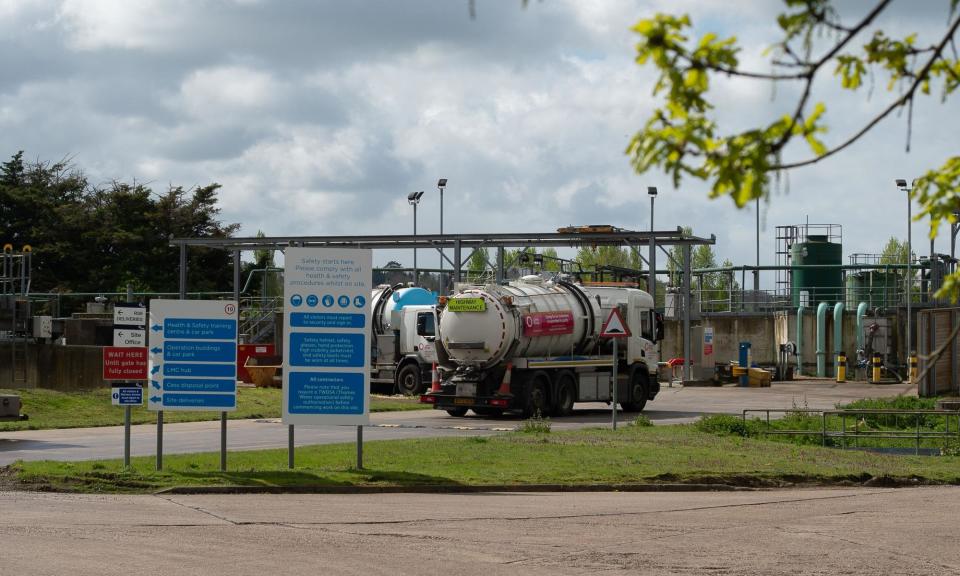Thames Water-linked firm paid £14m in dividends despite concerns over group

A development company that sells off land no longer needed by Thames Water has paid out a £14m dividend despite warnings that it could become engulfed by the water group’s financial woes.
Accounts filed at Companies House show Kennet Properties paid out a £14.5m dividend in the year to 31 March 2023 despite the difficulties faced by the wider group, which is facing going into administration.
The water group, which has an £18bn debt burden, is fighting for survival amid a standoff with the industry watchdog, Ofwat, and the government. The Guardian revealed on Thursday that ministers were considering a nationalisation plan that would add most of its £15.6bn debt to the public purse.
Thames, which has faced a public outcry over sewage dumping, needs to invest in its leaky infrastructure but hopes to raise consumer bills significantly to pay for it.
Kennet takes on land no longer needed by Britain’s biggest water company before developing it and selling it on, typically for housing or commercial premises. It also received income for the use of sewer networks by third parties for fibre-optic cabling.
Within Thames Water’s complex corporate structure, Kennet sits outside the ringfenced operating company, which is regulated by Ofwat. Its immediate parent is Thames Water Limited, and it is ultimately controlled by the group’s struggling parent, Kemble Water.
Kemble warned this month that it would not be able to pay back a £190m loan due at the end of April, after shareholders said last month that Thames was “uninvestable” due to Ofwat’s stringent approach. Kemble later missed an interest payment and it is feared that the company could collapse. Thames has said this would not affect its 16 million customers.
Both Thames Water and a group of lenders to Kemble have hired their own law firms as they prepare for a potential battle over a restructuring and any resulting losses for investors, the Daily Telegraph reported on Saturday.
In the accounts, Kennet noted that if Kemble defaults, debt holders may “enact their right to enforce their pledge over the shares” in its parent, “resulting in a potential change in ownership of the company”.
Jonathan Mogg, a Kennet director, said: “In the event of a change of ownership, the directors are unaware of the future intentions of the new owners. These conditions indicate the existence of a material uncertainty which may cast significant doubt about the company’s ability to continue as a going concern.
“However, with regard to the cashflow forecast, and after considering its current cash balance and other assets … the directors have a reasonable expectation that Kennet will continue operating for at least 12 months.”
Mogg said that Kennet had sought legal advice and that it was not reliant on other companies in the group to continue trading. Auditors at PwC – which has issued warnings about the future of Kemble – signed off the accounts.
Kennet said it had £1.2m in cash and that, in a worst-case scenario, it could use this cash, sell parcels of land for development at auction or not renew an agreement, introduced last year and due to end in June, whereby a third party company collects income for the use of the sewer network.
The accounts, filed more than 12 months after the end of Kennet’s financial year, showed that the company made a £1.15m pre-tax profit for the year to 31 March 2023, up from £374,000 a year earlier. Revenues rose to £1.6m in 2023 – up from £1m in 2022 – comprised of £735,000 from property sales and £858,000 from sewer network income.
The Guardian revealed last year that Ofwat was investigating a separate internal dividend payment of £37.5m, made by Thames Water’s operating company to Kemble last year. Kemble relies on payments from group companies to service its debts, and Thames has not paid out a dividend to its external shareholders since 2017.
Sources close to Kemble said the Kennet dividend had ultimately been paid to another group company, the floating solar project developer Trinzic Energy.
Kennet said that it expected to continue focusing on selling off land for residential and commercial use and also “explore commercial options” for the use of sewer networks by third parties for further fibre-optic cabling.
Kemble and Thames Water declined to comment.

 Yahoo Finance
Yahoo Finance 